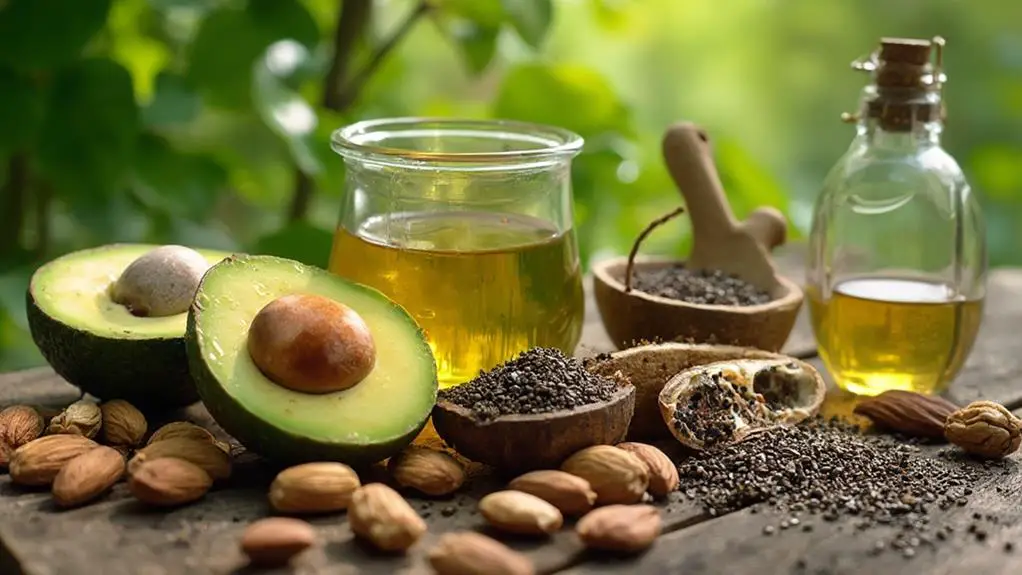Endurance hiking demands a nutritional approach that fuels prolonged exertion and guarantees energy maintenance. An ideal diet consists of 45-55% carbohydrates for sustained energy, prioritizing complex carbs like oats or quinoa. Protein, making up 10-15% of diet, aids muscle recovery, with lean sources like fish and beans being ideal. Healthy fats, comprising 35-40% of intake, provide concentrated energy through foods like avocados and nuts. Adequate hydration, with 16-20 ounces of fluid per hour, is essential. Incorporating vitamins and minerals such as B vitamins, magnesium, and iron is vital for energy and recovery. More insights follow on strategic meal timing.
Key Takeaways
- A balanced diet for endurance hiking includes 45-55% carbohydrates, 35-40% fats, and 10-15% protein.
- Aim for 30-60 grams of carbohydrates per hour to maintain energy during hikes.
- Pre-hike meals should have 1-1.5 grams of carbohydrates per kilogram of body weight.
- Post-hike recovery should include 30-35 grams of protein within 30-45 minutes.
- Hydrate with 16-20 ounces of water per hour during activity and include electrolytes.
Importance of Hiking Nutrition
Understanding the importance of hiking nutrition is essential for anyone engaging in prolonged physical exertion. Proper nutrition is vital in maintaining hiking energy and preventing fatigue, including the detrimental effect known as "bonking." This occurs when glycogen stores are depleted, underscoring the necessity of a well-balanced diet tailored to the energy demands of hiking.
A balance of 45-55% carbohydrates, 35-40% fats, and 10-15% protein is recommended to support stamina and facilitate recovery.
While carbohydrates are often celebrated as the primary energy source, it is important not to overlook the role of fats and proteins in sustaining energy. Fats provide a concentrated energy source, while proteins support muscle maintenance and repair, essential for prolonged hikes.
Nutrition myths, such as the belief that only carbohydrates matter, can lead to inadequate fuel strategies. Embracing a balanced approach is significant to optimizing performance.
Hydration further complements nutritional efforts, with goals of 14-22 ounces of water pre-hike and 16-20 ounces per hour during activity.
Post-hike, a meal rich in protein and carbohydrates within 30-45 minutes aids muscle recovery and replenishes energy stores, ensuring preparedness for future adventures.
Carbohydrates for Sustained Energy

Fueling your hike with the right carbohydrates is vital for sustained energy and endurance. Carbohydrates are the primary fuel source for hikers, providing the necessary energy to maintain physical exertion and delay fatigue. It is recommended to consume 30-60 grams of carbohydrates per hour during a hike. This can be achieved through a combination of carb-rich foods and energy gels, which offer quick energy replenishment.
Complex carbohydrates, such as oats, quinoa, and brown rice, are beneficial due to their slow digestion and steady glucose release, guaranteeing prolonged energy supply.
Carbohydrate timing is significant in hiking nutrition. Consuming a carbohydrate-rich meal before starting your hike is important to guarantee glycogen stores are fully stocked. Including fruits and vegetables in this meal not only enhances carbohydrate intake but also provides essential vitamins and hydration.
During the hike, regular snacking every 1-2 hours on carbohydrate-rich options, such as trail mix or energy bars, can help maintain blood sugar levels and endurance.
Incorporating appropriate snack combinations that balance complex and simple carbohydrates can optimize energy levels. Careful planning of carbohydrate intake guarantees hikers are well-fueled for the demands of the trail.
Protein for Muscle Recovery
Protein plays a vital role in muscle recovery after hiking, offering the essential amino acids necessary for muscle repair and growth. Consuming protein-rich foods post-hike is fundamental for optimizing muscle healing, particularly within the 30-45 minute recovery window. Lean sources like chicken, turkey, fish, tofu, lentils, and beans are effective choices to enhance muscle repair. Additionally, protein-rich snacks such as nuts, seeds, and jerky can support muscle strength and recovery strategies during hikes.
Protein Sources and Benefits
| Protein Source | Benefit for Recovery |
|---|---|
| Chicken, Turkey | High in lean protein |
| Fish, Tofu | Provides essential amino acids |
| Lentils, Beans | Plant-based options |
| Nuts, Seeds, Jerky | Convenient on-the-go snacks |
To maximize the benefits of protein for muscle repair, aim for a post-hike meal containing approximately 30-35 grams of protein. This practice aids in reducing muscle soreness and prepares the body for subsequent hiking activities. Protein shakes, such as Sci-MX Total Protein, offer a practical method to meet these protein needs efficiently, especially after strenuous hikes. Consistent protein intake, particularly in the hours following physical exertion, is a significant recovery strategy, supporting enhanced muscle recovery and overall endurance. Prioritizing protein in your hiking nutrition plan guarantees your muscles recover effectively, allowing for sustained hiking performance.
Healthy Fats for Endurance

While protein plays an important role in muscle recovery, incorporating healthy fats into your diet is equally beneficial for endurance during hiking. Healthy fats provide a dense calorie source that is essential for maintaining energy levels on long hikes. Foods rich in healthy fats, such as avocados, nuts, seeds, and fatty fish like salmon, not only supply calories but also aid in nutrient absorption and increase satiety, thereby preventing fatigue.
A strategic approach to integrating healthy fat sources involves including them in pre-hike meals to enhance energy availability. For instance, spreading nut butter on whole grain bread or preparing a trail mix with nuts and seeds are practical and effective options.
During the hike, consuming fat-based snacks such as trail mix or energy bars containing nut oils can provide a steady energy release over extended periods.
To optimize performance and recovery, it is recommended that about 35-40% of your daily caloric intake comes from healthy fats. This balanced diet approach not only supports sustained energy levels but also aids in recovery after a challenging hike.
Essential Vitamins and Minerals
Recognizing the essential role of vitamins and minerals in hiking nutrition can greatly enhance endurance and overall performance. Key vitamins such as Vitamin C and E are particularly significant for their ability to reduce oxidative stress and bolster the immune system, important for hikers facing various environmental challenges. Good vitamin sources include citrus fruits, nuts, and seeds.
For energy metabolism, B vitamins, particularly B1, B2, and B3, are indispensable. They efficiently convert carbohydrates, fats, and proteins into usable energy, sustaining hiking performance over extended periods. Whole grains and lean meats serve as excellent sources for these vitamins.
Mineral absorption is equally important. Magnesium plays a significant role in muscle function and recovery, while also regulating blood pressure, preventing cramps and fatigue. Dark leafy greens and nuts are effective magnesium sources.
Iron is essential for oxygen transport in the blood, with adequate levels necessary to fend off fatigue. Hikers, especially females, should focus on iron-rich foods like red meat and lentils.
Hydration Strategies

Guaranteeing proper hydration is essential for maintaining energy levels and preventing fatigue during hikes. Effective hydration techniques begin with pre-hike preparation, where consuming 14-22 ounces of water two hours before departure is recommended.
During hikes, adjust hydration frequency to approximately 250 ml (8 ounces) of water per hour. This baseline should be modified according to environmental factors such as temperature and altitude, as both can increase fluid needs. Altitude adjustments are critical; higher elevations may necessitate greater fluid intake due to increased respiratory water loss.
Hydration myths often suggest relying solely on thirst signals, but proactive hydration tracking is more reliable. Monitoring urine color, aiming for a light yellow, provides a practical indicator of hydration status.
Electrolyte balance is another key component, especially for hikes exceeding two hours in warm conditions. Incorporate electrolyte tablets, drinks, or salty snacks to maintain sodium levels and prevent hyponatremia.
Identify reliable water sources along your route to replenish supplies. Employ hydration gear such as water bladders or bottles with easy access to guarantee consistent intake.
Pre-Hike Meal Planning

Effective pre-hike meal planning is essential for maximizing endurance, focusing on a balanced intake of important nutrients such as carbohydrates, proteins, and healthy fats.
A carbohydrate loading strategy should involve consuming 1 gram of carbohydrates per kilogram of body weight, emphasizing complex sources like oatmeal to guarantee a sustained energy release.
Additionally, proper hydration is critical, with a recommendation to drink 14-22 ounces of water at least two hours before the hike to maintain ideal hydration levels and enhance overall performance.
Essential Nutrients Consideration
How can you enhance your energy levels for a challenging hike? The key lies in thoughtful meal composition and nutrient absorption. A pre-hike meal should be balanced, incorporating 1-1.5 grams of carbohydrates per kilogram of body weight. This guarantees adequate glycogen stores, essential for sustained energy. Carbohydrates are rapidly absorbed, providing a quick energy boost, which is crucial for maintaining endurance.
Including 20-25 grams of protein in your meal is equally important. Protein aids in muscle preservation, preparing your body for the physical demands ahead. Healthy fats, such as those from nuts or avocados, contribute to sustained energy release due to their slower digestion rates. This balanced nutrient absorption from fats complements the immediate energy supplied by carbohydrates.
Timing your meal intake is essential; eating 2-3 hours before starting allows for effective digestion and nutrient absorption. Closer to your hike, consider light snacks like energy bars or fruit for an additional energy surge.
Hydration should not be overlooked; consuming at least 12 ounces of water pre-hike supports optimal body function and prevents dehydration. This strategic approach guarantees you are well-prepared, enhancing energy levels for an enduring hiking experience.
Carbohydrate Loading Strategy
Maximizing energy levels for a challenging hike involves not only considering the types of nutrients consumed but also strategically planning carbohydrate intake in the days leading up to the activity.
Carbohydrate loading is a proven strategy aimed at maximizing glycogen stores, essential for sustained energy during endurance hiking. This process involves consuming 8-10 grams of carbohydrates per kilogram of body weight. Ideal carbohydrate sources include complex carbohydrates, such as whole grains, oats, fruits, and vegetables, which provide a steady release of energy.
To effectively implement a carbohydrate loading strategy, consider these practical tips:
- Select balanced meals: Opt for pre-hike meals like oatmeal with bananas and honey, or whole-grain pasta with light tomato sauce, maintaining a carb-to-protein ratio of approximately 3:1.
- Timing: Aim to consume these meals 2-3 hours before starting your hike to allow for ideal digestion and energy availability.
- Hydration: Accompany carbohydrate loading with adequate hydration to support performance and prevent dehydration, though specific hydration strategies will be addressed separately.
Hydration Preparation Essentials
A hiker's success in endurance activities hinges on both nutrition and hydration strategies. Effective hydration techniques are paramount when planning your pre-hike regimen.
Begin by focusing on adequate water intake; drink 14-22 ounces of water around two hours before you set out on your hike. This practice guarantees optimal hydration levels, preparing your body for the exertion ahead. Besides, identifying reliable water sources along your hiking route is essential. These can include natural springs, streams, or designated refill stations, providing you with opportunities to maintain hydration throughout the hike.
In conjunction with hydration, pre-hike meal planning should emphasize carbohydrate intake. Consuming 8-10 grams of carbohydrates per kilogram of body weight in the days preceding your hike is recommended to maximize glycogen stores.
A balanced breakfast, rich in carbohydrates (1g/kg body weight) and containing 20-25 grams of protein, is also advised. This meal should total 300-500 calories, focusing on easily digestible foods to avoid digestive discomfort.
Incorporating healthy fats can offer sustained energy, with an ideal caloric breakdown of approximately 45-55% carbohydrates, 35-40% fats, and 10-15% protein, therefore guaranteeing extensive energy management and peak performance during your hike.
On-Trail Snacks

When selecting on-trail snacks, hikers should prioritize nutrient-dense options that provide a balance of carbohydrates, proteins, and healthy fats to maintain energy levels and muscle function.
Trail mix, combining dried fruits, nuts, seeds, and dark chocolate, offers a compact source of quick energy and essential nutrients, while energy bars made from whole foods can provide a stable energy release with minimal sugars.
Additionally, portable protein options like jerky and easy-to-carry fruits such as bananas and apples supply both hydration and nutritional support for endurance and satiety during long hikes.
Nutrient-Dense Snack Choices
Selecting the right on-trail snacks is vital for maintaining energy levels and supporting endurance during hikes. Choosing nutrient-dense options that provide a balance of carbohydrates, proteins, and healthy fats is essential. Effective snack combinations can optimize energy intake and enhance performance. A recommended intake of 30-60 grams of carbohydrates per hour is critical for sustaining energy levels during prolonged activities.
Trail mix is an excellent choice, combining nuts, seeds, and dried fruits. This mix offers not only calorie density but also healthy fats and natural sugars for a quick energy boost.
Energy bars, often made with whole grains, proteins, and essential vitamins, provide a convenient and nutrient-dense option for hikers. They are easy to carry and consume, making them a practical choice for maintaining energy on the trail.
Jerky, available in beef, turkey, or plant-based varieties, delivers a high-protein snack that supports muscle repair and recovery. Its lightweight and shelf-stable nature make it ideal for endurance hiking.
Dried fruits like apricots, figs, and raisins also serve as effective snacks, replenishing glycogen stores with their natural sugars and fiber.
- Trail Mix: Nuts, seeds, and dried fruits
- Energy Bars: Whole grains and proteins
- Jerky: High-protein options
Quick Energy Boosters
Building on the foundation of nutrient-dense snack choices, quick energy boosters are a critical component for maintaining stamina on the trail. Hikers should aim to consume 30-60 grams of carbohydrates per hour to counteract fatigue. Performance snacks such as energy gels and quick bites are designed for this purpose, offering rapid energy release through easy-to-digest carbohydrates. Incorporating natural sweeteners like honey or maple syrup in snack recipes can enhance energy levels while offering an appealing flavor combination.
Trail mix remains a quintessential choice, combining dried fruits, nuts, and seeds to provide a balanced intake of healthy fats, proteins, and carbohydrates. Its versatility and convenient snack packaging make it a go-to option for sustained energy. Dried fruits, particularly apricots and dates, serve as compact sources of quick energy, rich in natural sugars and high in calories.
Hydration supplements are equally important as they can provide additional electrolytes, guaranteeing proper nutrient timing and hydration on strenuous trails.
Energy bars formulated with whole food ingredients are another practical option, balancing protein, carbs, and healthy fats. These options collectively guarantee hikers are well-fueled and prepared for the demands of endurance hiking.
Portable Protein Options
For hikers seeking to maintain energy and muscle function during long treks, incorporating portable protein options into their snack lineup is vital. Selecting trail-friendly options that enhance protein intake can support energy balance and nutritional timing, important for endurance activities.
Convenient protein sources like beef jerky provide approximately 7 grams of protein per ounce, making them a nutrient-dense choice. Nuts and seeds, such as almonds and pumpkin seeds, offer around 6 grams of protein per ounce and contribute healthy fats for sustained energy.
Recommended Portable Protein Options:
- Protein Bars: Choose those with at least 10 grams of protein and minimal added sugars to enhance snack combinations.
- Nut Butter Packets: Offering about 8 grams of protein per serving, these can be paired with whole-grain crackers or fruit.
- Shelf-Stable Greek Yogurt: Provides 15-20 grams of protein per serving, ideal for meal variety when rehydrated on the trail.
These food pairings not only diversify meal variety but also guarantee adequate protein intake. Confirming that your snack combinations align with your nutritional needs can make a significant difference in maintaining energy levels and muscle recovery during extended hikes.
Post-Hike Recovery Foods

After a strenuous hike, something fundamental to contemplate is the nutritional strategy for ideal recovery. Proper nutrient timing can greatly enhance recovery and reduce muscle soreness. Consuming a balanced meal within a 30-45 minute window is essential, ideally featuring a 4:1 ratio of carbohydrates to protein. This ratio aids in effectively replenishing glycogen stores and repairing muscle tissues.
Recovery smoothies are an excellent option, offering a convenient blend of carbohydrates and protein. Consider using ingredients like banana, Greek yogurt, and spinach to create a nutrient-dense recovery smoothie that also hydrates.
Aim to consume 30-35 grams of protein and carbohydrates within 1-2 hours post-hike. Incorporating foods such as quinoa salads, chicken stir-fry, or whole grain sandwiches can provide a balance of carbohydrates, protein, and healthy fats necessary for recovery.
Hydration is equally important; consuming 16-20 ounces of water per hour of hiking aids in rehydration and supports recovery efforts.
For immediate post-hike nourishment, real food options like beef jerky, granola bars, and nut butter packets are practical and nutrient-rich, offering convenience without compromising recovery needs. These choices guarantee that the body receives essential nutrients promptly, facilitating effective recovery.
Managing Electrolytes

Electrolyte management is a significant aspect of endurance hiking, as these essential minerals play an important role in fluid balance, muscle function, and nerve signaling. Maintaining ideal levels of electrolytes, such as sodium, potassium, and magnesium, is essential to prevent conditions like hyponatremia and to sustain performance during hikes exceeding two hours.
Consuming a variety of electrolyte sources is recommended, including sports drinks, electrolyte tablets, and whole foods like nuts, seeds, and olives.
Monitoring hydration through electrolyte testing can be effectively done by observing urine color. A pale yellow color typically signifies adequate hydration and electrolyte balance, while darker shades may indicate the need for increased fluid and electrolyte intake. This practical approach enables hikers to make timely adjustments to their hydration and electrolyte replenishment strategies.
Below are practical tips for managing electrolytes during endurance hiking:
- Regularly consume electrolytes through diverse sources to maintain ideal levels.
- Monitor hydration by checking urine color to guide electrolyte and fluid intake.
- Post-hike recovery should include a snack with a 4:1 carbohydrate-to-protein ratio to replenish electrolytes and aid muscle recovery.
Lightweight Food Options

Selecting the right lightweight food options is critical for maintaining energy and endurance during extended hikes.
High-calorie snack choices such as energy bars and trail mix provide an efficient combination of carbohydrates, proteins, and healthy fats, essential for sustained energy without excess weight.
Compact nutrient-dense foods like dehydrated meals and freeze-dried options offer balanced nutrition and are easy to prepare, ensuring hikers have access to crucial nutrients on the trail.
High-Calorie Snack Choices
Understanding the importance of energy-dense snacks is essential for hikers seeking to maintain endurance without excessive pack weight. High-calorie options are vital for providing the necessary fuel on long treks while ensuring snack portability. Choosing snacks that offer around 100-200 calories per ounce can help hikers sustain energy levels efficiently.
Trail mix is a versatile option that combines nuts, seeds, dried fruits, and dark chocolate, delivering a balanced mix of healthy fats, protein, and carbohydrates. Its lightweight nature makes it a favorite among hikers aiming for sustained energy.
Energy bars crafted from whole ingredients are another practical choice, offering 200-300 calories per bar and ensuring easy consumption on the move. For those who prefer something compact yet potent, nut butter packets deliver approximately 90-100 calories along with essential healthy fats and protein, making them a convenient energy source.
- Trail Mix: Offers a blend of nuts, seeds, dried fruits, and dark chocolate for a balanced nutrient profile.
- Energy Bars: Whole ingredient bars provide substantial calories and are easy to carry.
- Nut Butter Packets: Deliver high-calorie content in a compact, portable form.
These snacks exemplify effective strategies for maintaining energy levels during endurance hiking.
Compact Nutrient-Dense Foods
Building on the foundation of high-calorie snack choices, the focus now shifts to compact nutrient-dense foods that are paramount for endurance hikers aiming to optimize their pack weight while guaranteeing adequate nutrition. These foods are designed to provide high calories and essential nutrients without excessive bulk, making them indispensable for those on multi-day hikes. Energy bar innovations, such as bars infused with superfoods and enhanced protein content, offer hikers quick energy boosts with minimal effort.
Meal prep tips include selecting freeze-dried meals, which are convenient and have a long shelf life. These meals deliver balanced nutrition, require minimal preparation, and are lightweight—ideal for extended hikes. For snacks, consider dried fruits, jerky, and whole food bars, which supply essential vitamins, minerals, and protein to sustain energy levels.
| Food Type | Nutrients Provided | Benefits |
|---|---|---|
| Energy Bars | Carbs, Protein, Fats | Quick energy, minimal weight |
| Freeze-Dried Meals | Balanced Nutrition | Long shelf life, easy prep |
| Trail Mix | Carbs, Healthy Fats | Sustained energy, variety |
| Dried Fruits | Vitamins, Minerals | Lightweight, nutrient-rich |
| Nut Butter Packets | Protein, Healthy Fats | Portable, calorie-dense |
Including nutrient-dense options like quinoa, legumes, and dark chocolate enhances meal variety and guarantees sufficient caloric intake.
Balancing Variety and Simplicity

Achieving the right balance between variety and simplicity in hiking nutrition is essential for maintaining both energy levels and meal satisfaction on lengthy treks. This balance can be approached through thoughtful meal prep and ensuring a pleasing flavor balance. Incorporating a diverse selection of foods not only prevents meal monotony but also caters to personal taste preferences, enhancing the overall hiking experience.
To achieve this, hikers should focus on practical, nutrient-dense options that are easy to prepare and carry.
- Nutrient-Dense Snacks: Including trail mix, energy bars, and fruits provides a balanced intake of carbohydrates, proteins, and healthy fats, critical for sustaining energy.
- Simple Meal Options: Utilize lightweight, easy-to-prepare foods like instant oatmeal or dehydrated meals, which offer high energy values and minimize meal prep complexity on the trail.
- High-Calorie, Compact Foods: Nut butter packets and whole food bars meet caloric needs without adding excessive weight to a hiker's pack, making them ideal for long distances.
Balancing nutrition and enjoyment is essential for endurance, emphasizing the need for meals that are both nutrient-rich and flavorful to maintain overall satisfaction and performance on extended hikes.
Meal Timing and Frequency

Strategically timing meals and snacks is essential for sustaining energy during a hike.
Pre-hike meals should focus on carbohydrates, consuming about 1g/kg of body weight 2-3 hours before setting out, to guarantee peak energy levels.
Throughout the hike, consuming 30-60 grams of carbohydrates every hour through regular snacking intervals is recommended for maintaining energy and preventing fatigue.
Optimal Snacking Intervals
For ideal energy management during hikes, consuming snacks at regular intervals of every 1-2 hours is necessary. This strategic snack timing fosters an ideal energy balance, essential for preventing fatigue and maintaining endurance.
Research indicates that frequent snacking is more effective than relying solely on three larger meals, thereby averting the dreaded "bonk" experienced during prolonged physical exertion.
Incorporating snacks that deliver 30-60 grams of carbohydrates per hour is recommended to replenish glycogen stores and sustain energy levels. This consistent carbohydrate intake stabilizes blood sugar levels, effectively preventing energy dips.
Such nutritional strategies are important for supporting endurance throughout the hike.
- Carbohydrate-rich snacks: Energy bars or gels that provide immediate energy boosts.
- Balanced snacks: Options like trail mix with nuts and dried fruits, offering a mix of carbohydrates, protein, and healthy fats.
- Hydration-focused snacks: Electrolyte drinks or water-rich fruits like oranges, which support hydration alongside energy replenishment.
Monitoring your body's energy needs and adjusting snack intake based on hike intensity can further enhance performance and recovery.
Pre-Hike Meal Planning
When planning your pre-hike meal, how can you guarantee it effectively fuels your journey ahead? Start by timing your meal 2-3 hours before commencing your hike, making sure it is rich in carbohydrates and protein. This approach promotes ideal energy levels and supports muscle function. Aim for a balanced breakfast of 300-500 calories with a macronutrient ratio of approximately 2:1 carbohydrates to protein. Such meal preparation is essential for sustained energy and minimizing fatigue during strenuous activities.
In the days leading up to a long hike, increase your carbohydrate intake to 8-10 grams per kilogram of body weight to maximize glycogen stores. This strategy allows your body to access readily available energy reserves.
Additionally, consider regular pre-hike snacks and meals every 1-2 hours before starting, which can help maintain stable blood sugar levels and further prevent energy dips.
To enhance comfort on the trail, minimize fiber intake in your pre-hike meal to reduce the risk of digestive discomfort.
Thoughtful planning and nutrient-focused meal preparation will make sure you are physically prepared for the demands of endurance hiking, enabling a more enjoyable and successful experience.
Navigating Dietary Restrictions

Successfully managing dietary restrictions while hiking requires careful planning and informed choices to guarantee adequate nutrient intake.
For those with gluten intolerance, gluten-free grains such as quinoa and rice serve as excellent carbohydrate sources. Incorporating plant-based proteins like tofu and lentils guarantees sufficient protein intake, crucial for muscle repair.
Additionally, seed-based snacks, such as sunflower seed butter or pumpkin seeds, offer a safe alternative for those with nut allergies, providing essential fats and proteins without the allergenic risks.
To maintain energy levels, consider lactose-free options or plant-based alternatives. Almond milk and coconut yogurt are excellent choices for lactose-intolerant hikers, guaranteeing calcium and protein needs are met without discomfort.
Hiking meal prep should focus on energy-boosting foods that sustain performance and prevent fatigue on the trail.
- Gluten-Free Grains: Quinoa and rice provide necessary carbohydrates.
- Seed-Based Snacks: Sunflower seed butter and pumpkin seeds offer protein and healthy fats.
- Lactose-Free Options: Almond milk and coconut yogurt supply calcium and protein.
Frequently Asked Questions
How Can I Prevent Digestive Issues During a Long Hike?
To prevent digestive issues during a long hike, implement effective hydration strategies and maintain a proper fiber balance. Gradually increase fiber intake before the hike and prioritize hydration, as both are essential for ideal digestive health and endurance.
What Are Some Plant-Based Protein Sources for Hikers?
Plant-based protein sources for hikers include legumes, such as lentils and chickpeas, offering numerous benefits like essential amino acids. Additionally, diverse nut varieties, including almonds and walnuts, provide healthy fats and proteins, enhancing endurance and recovery.
How Do Altitude Changes Affect Nutritional Needs?
Altitude changes necessitate increased caloric intake and specific altitude adaptation strategies. Nutritional focus should include iron-rich foods and heightened hydration strategies to combat dehydration risks, while emphasizing carbohydrates to support energy demands and enhance physiological adaptation at higher altitudes.
Are Energy Gels Effective for Long-Distance Hiking?
Energy gels are effective for long-distance hiking, offering benefits such as quick energy boosts and essential electrolytes. Ideal gel consumption timing is every 45-60 minutes during activity, ensuring sustained energy and preventing fatigue in nutrient-depleted conditions.
How Can I Minimize the Environmental Impact of My Hiking Diet?
Minimize environmental impact by choosing foods with sustainable packaging and prioritizing local sourcing. This approach reduces carbon footprint, supports local economies, and guarantees nutrient-dense options, aligning with practical advice for eco-conscious and effective hiking nutrition.
Conclusion
Effective nutrition is essential for endurance hiking, emphasizing the need for a balanced intake of carbohydrates, proteins, and healthy fats to sustain energy, support muscle recovery, and promote endurance. Incorporating essential vitamins and minerals is vital for overall health and performance. Selecting lightweight food options and balancing variety with simplicity can enhance meal planning. Attention to meal timing and frequency, alongside consideration of dietary restrictions, guarantees that nutritional needs are met, ultimately optimizing hiking performance and experience.